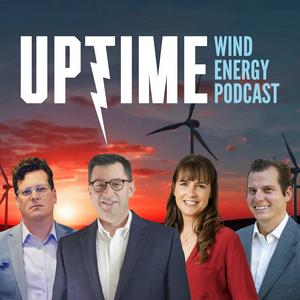RWE Suspends US Offshore Work, Spanish Power Blackout
This week we discuss a $5 million investment in a wind worker training center in Australia, challenges faced by RWE's US offshore wind projects due to recent policy changes, and the recent power blackout in Spain. Plus an article from PES Wind Magazine about cybersecurity in wind energy.
Sign up now for Uptime Tech News, our weekly email update on all things wind technology. This episode is sponsored by Weather Guard Lightning Tech. Learn more about Weather Guard's StrikeTape Wind Turbine LPS retrofit. Follow the show on Facebook, YouTube, Twitter, Linkedin and visit Weather Guard on the web. And subscribe to Rosemary Barnes' YouTube channel here. Have a question we can answer on the show? Email us!
You are listening to the Uptime Wind Energy Podcast brought to you by build turbines.com. Learn, train, and be a part of the Clean Energy Revolution. Visit build turbines.com today. Now here's your hosts, Allen Hall, Joel Saxum, Phil Totaro, and Rosemary Barnes.
Allen Hall: Down in Victoria, Australia. They're investing about 5 million Australian dollars to establish a wind worker training center, which is focused on developing technical skills for both onshore and offshore wind energy roles.
And the initiative is looking to create a skill workforce pipeline for all the wind projects that are happening down in Australia. This is a really unique. Program, uh, Rosemary, just because Victoria is looking to have about 67,000 workers in energy by 2040 and they think they need about 4,000, [00:01:00] uh, people to work construction for onshore wind at about 2,500 data for offshore wind.
That's a sizable number of people, but Victoria is headed towards 95% renewable generation by 2035. So you're gonna need to build a workforce pretty quickly. $5 million for a training center is a good first start. Is it enough though?
Rosemary Barnes: Yeah, I mean, they need to have a first step I guess. I mean, not that it's the first step, there's already a lot of, a lot of workers in the state.
Um, but I mean, for sure Victorian needs more, needs more service technicians and yeah, a bunch of other, other workers. I mean there's also still a lot of new wind farms being built, so there's that as well. It's also not just Victoria, you know, all around. Um, there was quite a lot of going on in Queensland, although the future plans have, I think been, um.
Uh, toned down a lot because the government changed. Um, south Australia also has, uh, still got, oh, it's got a lot of wind, already got a lot of plans to build [00:02:00] more. Um, and yeah, there's new renewable energy zones that are, you know, hopefully coming on, maybe even offshore wind starting in the next five years or so.
So yeah, if you want to, you know, suddenly expand your industry, then you do need to think a few years ahead. Um, otherwise you're gonna end up. With a big, a big crunch. Everyone wanting to build a project at the same time. And also, you know, a lot of wind farms. Uh. Getting past that first, you know, like the first few years where not too much maintenance is needed.
Um, there's a lot more things that can go wrong in the, you know, middle to end of a wind farm's life. And we're seeing a lot of that, especially in Victoria where they had most of the early wind farms in Australia. So I definitely think it's timely and uh, hopefully this one's successful. And, uh, yeah, we've got an election coming up.
Probably will have already happened by the time this episode's released. We've got a federal election. There has not been a whole lot of talk about renewable energy actually. Um, and especially the jobs that are created by Renewal Energy, especially wind, you know, like it's a, it's a [00:03:00] downside of the technology that it needs maintenance, but it's a real upside in terms of that, you know, a lot of maintenance means a lot of maintenance jobs, and these are good jobs.
I hope that, yeah, by the time we have our next election,

